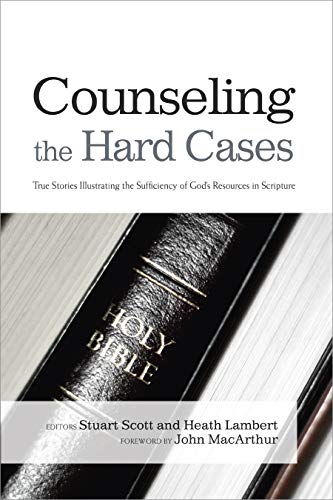
Quotes by Stuart Scott
What am I willing to sin to get, or sin if I don’t get? For me, to really live is what? What have I habitually sought and set my heart on in this life?… The human heart always fixates on some object of worship because we were created worship (Deut. 11:16; John 4:23; Rom. 1:18-32; Col. 1:16).
Counseling the Hard Cases, Edited by Stuart Scott and Health Lambert, B&H Publishing, 2012, p. 215, Used by Permission.
Godly concern is caring about important things for the right reasons. It is also accompanied by a trust in God’s ultimate control and faithfulness. This kind of concern helps you be responsible to God and does not send you into a confused status. It will involve a focus on the responsibilities for today, eternal goals and others… For your concern to be the right kind of concern you must be focused on what is true and helpful from God’s perspective (see 1 Cor. 7:32-33; 2 Cor. 11:28; Phil. 2:20)… [However], ungodly concern (anxiety) goes beyond reasonable concern and involves worry about mere possibilities. When we are anxious, we are not focused on God and what is true and helpful. When we are anxious, we are often concerned that something we want to happen may not happen. Therefore, we are focused on difficulties of the future, temporal matters, and self (see Mt. 6:31-32).
Just as pride is the root of every evil, humility is the root of every virtue.
The Exemplary Husband, Focus Publishing, 2000, p. 185. Get this book!
[Personal differences have many advantages]:
They can encourage us to search the Scriptures (Psm. 119:71-72).
They can help us think carefully about how and what we think or what we believe (Pro. 15:28).
They can help us work harder at communicating effectively (Eph. 4:25).
They can produce maturity and endurance (Jas. 1:2-5).
They can help us sharpen one another (Pr. 27:17).
They can strengthen our faith in the truth that God is working all things for our good (Rom. 8:28-29).
They give us opportunity to practice servanthood and preferring one another (Phil. 2:2-3).
They give us opportunity to love and glorify God (1 Cor. 10:31-32).
The Exemplary Husband, Focus, 2000, p. 250. Get this book!
Your communication will reveal the kind of [person] you really are, because what comes out of your mouth is usually what’s in your heart. If you truly desire to exemplify Christ you will seek to become a good communicator. Everything that Jesus Christ communicated was holy, clear, purposeful and timely.
The Exemplary Husband, Focus Publishing, 2000, p. 229. Get this book!
A person who gratifies himself (masturbates) is totally self-focused. This act is clearly not the right use of our intimate parts. Our bodies do not belong to us but to God and to our spouse; otherwise, we’re being selfish (1 Corinthians 7:4; 13:5). Another reason masturbation is wrong is because it usually involves engaging in lustful thoughts (Philippians 4:8). A third reason is that it becomes a very enslaving activity (1 Corinthians 6:12). Finally, it removes any need of self-control in the sexual area (1 Corinthians 7:1-2; Galatians 5:22-23).
The Exemplary Husband, Focus, 200, p. 150. Get this book!
One of the things that can help very different spouses the most (in conflict resolution) is growth in God’s Word. The more we have God’s Word in common as husbands and wives, the more we will agree. The more each mind is renewed (changed) by the Scripture, the more similarly a couple will think (Romans 12:2). One of the worst things a couple can do is work to change one another into each other’s likeness. They are to be changed, rather, into Christ’s likeness. The more a couple works at love and becoming one, the more differences will be accepted and blended to enhance the marriage.
The Exemplary Husband, Focus, 2000, p. 244. Get this book!
[Love is] a selfless and enduring commitment of the will to care about and benefit another person by righteous, truthful, and compassionate thoughts, words and actions.
The Exemplary Husband, Focus, 2000, p. 106. Get this book!


